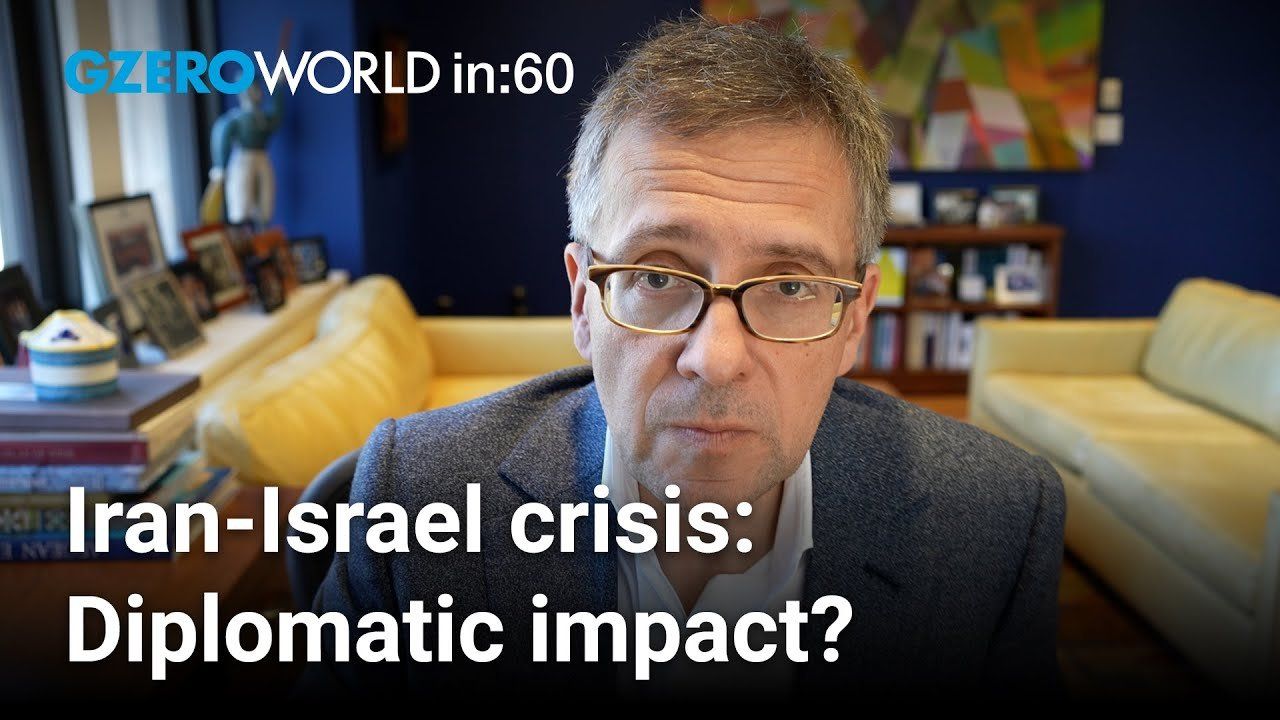Ian Bremmer shares his insights on global politics this week on World In :60.
Does the Iran-Israel crisis offer a unique opportunity for diplomacy?
I don't think so. They certainly give an opportunity for a bunch of countries to reengage with Israel. We're seeing that with Jordan, with Saudi Arabia, and to show the Iranians that they are still considered to be the big concern as an enemy in the region, a disrupter. But that's very different from saying we're going to see a breakthrough in relations. You're not resetting deterrence. Iran is going to continue to lead the axis of resistance and provide weapons and intelligence and engage in strikes against targets across the region. Israel will still hit Iranians that are operating there. So going forward, I think the dangers are still pretty high.
Is Germany's Scholz meeting with Xi in Beijing indicating a shift in Europe-China trade tensions?
Not really. Here, the fact that Scholz has a large number of German CEOs in tow means that, yes, he's concerned that the Chinese are providing support to Russia, maybe even increasingly dual-use military support to Russia in the war in Ukraine. He's concerned about Chinese industrial policy that's undermining, the interests of Americans and Europeans economically. But ultimately he is very reliant on investment and trade with China, and he's going to continue to support that. He is not fully aligned with his government on this issue, not his advisors, not his foreign minister, and certainly not the other parties in the coalition. But it is Scholz's perspective. And as a consequence, it is going to be a pretty friendly trip.
Why is Sudan's year-long conflict gone largely unnoticed?
Well, we write about it a fair amount, but I mean, the fact that it is in a part of the world that doesn't have economic implications. So you blow up Ukraine, and Russia is in a fight, and energy prices and food and fertilizer prices go up. Major conflict in Sudan. A lot of people suffer, a lot of people die, but the rest of the world has no impact economically. Also, most of the refugees, people fleeing, fleeing to neighboring African countries, they're not coming over to Mexico, the United States or to Poland and to Germany. And that just doesn't lead to a lot of attention. Final point is that there aren't a lot of journalists on the ground from the West in Sudan. And so not a lot of people are actually covering this. So for all of those reasons, not getting a lot of attention, but we'll keep talking about it.
- Why Olaf Scholz smells like toast ›
- Enter Olaf — can he keep Germany’s traffic light blinking? ›
- The Graphic Truth: Crisis on top of crisis in Sudan ›
- Biden’s Iran dilemma ›
- Iran attacks Israel ›
- Iran strikes Israel. How will Netanyahu respond? ›
- Israel attacks Iran - GZERO Media ›
- Hamas leader assassinated in Iran - GZERO Media ›
More For You
As expected, the Supreme Court struck down the bulk of Donald Trump's sweeping “Liberation Day” tariffs as illegal … and almost nothing changed.
Most Popular
What’s Good Wednesdays™, February 25, 2026
Small businesses at a crossroads
Chris, an Army veteran, started his Walmart journey over 25 years ago as an hourly associate. Today, he manages a Distribution Center and serves as a mentor, helping others navigate their own paths to success. At Walmart, associates have the opportunity to take advantage of the pathways, perks, and pay that come with the job — with or without a college degree. In fact, more than 75% of Walmart management started as hourly associates. Learn more about how over 130,000 associates were promoted into roles of greater responsibility and higher pay in FY25.
Somewhere in the Donbas region, Ukrainian soldier Artem Bondarenko says he hasn’t slept through the night in months as he defends Eastern Ukraine.
In the latest episode of Vladimir Putin and Xi Jinping's hit wellness podcast This Authoritarian Life, we learn how positive communication patterns can break negative cycles in our relationships -- especially our relationships with Iran, Syria, Venezuela, and Cuba. #PUPPETREGIME
